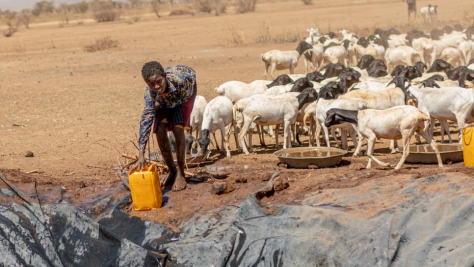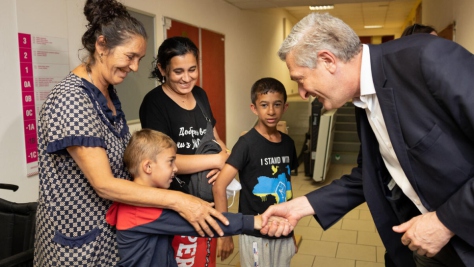A huge burden lifted as refugee restaurant owner gains Estonian citizenship
Karwan has worked hard to fit in, learning the language, making friends, finding employment, starting a family. It all paid off earlier this year.
TALLINN, Estonia, May 11 (UNHCR) - Karwan first passed through Estonia in 2003 when he was on the run from Iraq's Kurdistan region during the rule of Saddam Hussein and heading for Finland, where he had close relatives. Denied entry to Finland, immigration officers sent him back to Estonia.
It was not a warm welcome. He was handcuffed at the border and taken to a detention centre, where he was held for six months. But after being provided with subsidiary protection status in Estonia, he decided to try and start a new life in the capital Tallinn.
After struggling at first, 37-year-old Karwan has learned the language, made friends, found employment, married a girl from Georgia and started a family. In mid-February this year, he also became the first person allowed to stay on humanitarian grounds to be granted Estonian citizenship.
He has certainly worked hard to be accepted. "I have many friends here. With Estonians, I have never felt the attitude that I don't belong," he revealed, adding: "Now it's even better than before. Maybe it's because I speak Estonian and that makes them more forthcoming, more open to talk and communicate."
But things looked grim in 2003, when Karwan fled from his homeland to escape years of persecution and warfare. "I remember one night in the 1980s, when my mother woke me up and took me to the basement because the planes were coming [to bomb]," he recalled. "Our lives were in danger all the time."
His mother died in their mountain refuge, and talking about this brought back bad memories. "I still feel the cold and the hunger, and when we went back to the village I couldn't study anymore," Karwan recalled. In his mid-20s, he decided it was time to find a country where he would feel safe and could study in peace.
He made his way north through Turkey and the Russian Federation before ending up in Estonia. After being given international protection status, which allowed him to travel and work, Karwan rented an apartment and looked for a job.
It was a bit of a struggle, but he persevered and was hired by a car wash before finding work as a chef, making shashlik in a fast food restaurant. He eventually saved enough money to open his own restaurant in Tallinn almost exactly three years ago. "Our place is unique . . . We butcher our own meat and make fresh kebabs and falafel," Karwan proudly revealed.
His life revolves around the restaurant and his wife and two children, a boy aged seven years and a six-year-old girl. "A lot of my friends come to the restaurant to enjoy the food and have a chat. I really like their different backgrounds," he said.
But although he was well integrated, Karwan always felt something was missing until he became an Estonian citizen at a ceremony in Tallinn in February. "There was a huge burden on my shoulders, and now it was lifted," he told UNHCR. "Everything felt different, safer, better." The proud new Estonian celebrated with his family and staff. "I bought dessert for people here at work - a small party with food - and just sat and talked."
He's not completely out of the woods. His children are currently regarded as Iraqi, even though they were born in Tallinn. But Estonia changed its citizenship law at the start of this year and when it comes into force on January 1, 2016, beneficiaries of international protection will not have to prove that they have relinquished their former citizenship to obtain Estonian nationality.
This will help his children as well as other people given international protection (about 90 people in Estonia at the end of last year). Also in 2014, a total 143 new asylum applications were lodged, up 50 per cent on the year before, with the bulk coming from the Ukraine and Sudan. And 20 people were granted refugee status in Estonia last year.
Karwan, meanwhile, is looking forward to an even rosier future. "I love working here," he said, adding that he was thinking of opening a second restaurant.
By Salvador Merlos and Eero Janson in Tallinn, Estonia
Related news and stories
Twelve years on, Syrian refugees face deepening debt and hunger
UN Refugee Agency warns of extreme hardship for forcibly displaced families this winter
How Thailand's grassroots organizations are working to end statelessness
Iraqi doctor provides care and comfort to Yazidi survivors
Iraqi doctor provides care and comfort to Yazidi survivors
Yazidi women box their way to recovery
-

UNHCR appeals for life-saving aid for millions affected by catastrophic Horn of Africa drought
28 Jun 2022 -

Strengthening Mental Health and Psychosocial Support in UNHCR - Achievements in 2021 and priorities for 2022 and beyond
28 Jun 2022 This report highlights the progress on UNHCR's action plan on 'Strengthening MHPSS in 2021' and lays out the priorities for 2022 and beyond. -

Ethiopian families struggle to survive amid record drought
28 Jun 2022 UNHCR is supporting local authorities in the Somali Region of Ethiopia to provide urgent aid to thousands forced to leave in search of water during worst drought for 40 years. -

News Comment: UNHCR's Grandi welcomes developments on EU asylum reform, encourages further progress under Czech EU Presidency
28 Jun 2022 Statement attributed to the UN High Commissioner for Refugees, Filippo Grandi -

Spanish: Guidance on Promoting Child Protection Outcomes through CBI - Full version
28 Jun 2022 Esta guía se ha desarrollado para ayudar en el uso de intervenciones basadas en efectivo para mejorar los resultados de protección infantil. Se basa en el conocimiento y la práctica existentes del ACNUR y otras fuentes, y refleja los aportes de una serie de partes interesadas del ACNUR en las operaciones en los países, a nivel regional, así como la -

Arabic: Guidance on Promoting Child Protection Outcomes through CBI - Full version
28 Jun 2022 تم تطوير هذا الدليل للمساعدة في استخدام التدخلات القائمة على النقد لتعزيز نتائج حماية الطفل. وهو يعتمد على المعرفة والممارسات الحالية من المفوضية ومصادر أخرى ، ويعكس المدخلات من عدد من أصحاب المصلحة في المفوضية في العمليات القطرية ، على المستوى الإقليمي ، وكذلك -

MHPSS Annex of Public Health Strategy 2021-2025
28 Jun 2022 This technical sheet mainly focuses on what health actors in refugee settings should do with regard to Mental Health and Psychosocial Support and how to coordinate around MHPSS with other sectors. -

Arabic: Guidance on Promoting Child Protection Outcomes through CBI - Summary version
28 Jun 2022 تم تطوير هذا الدليل للمساعدة في استخدام التدخلات القائمة على النقد لتعزيز نتائج حماية الطفل. وهو يعتمد على المعرفة والممارسات الحالية من المفوضية ومصادر أخرى ، ويعكس المدخلات من عدد من أصحاب المصلحة في المفوضية في العمليات القطرية ، على المستوى الإقليمي ، وكذلك -

Spanish: Guidance on Promoting Child Protection Outcomes through CBI - Summary version
28 Jun 2022 Esta guía se ha desarrollado para ayudar en el uso de intervenciones basadas en efectivo para mejorar los resultados de protección infantil. Se basa en el conocimiento y la práctica existentes del ACNUR y otras fuentes, y refleja los aportes de una serie de partes interesadas del ACNUR en las operaciones en los países, a nivel regional, así como la

